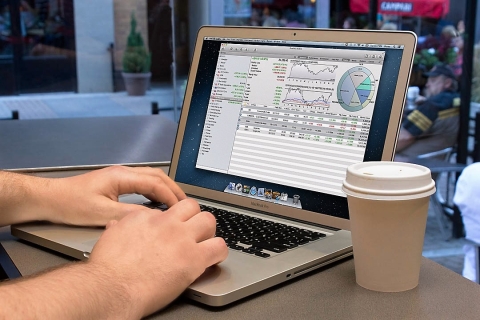
Dear fellow journalists,
I write to you with concern, as it has come to my attention that many, if not most of you dread working with spreadsheets.
I understand this fear. Journalists tend to come from arts or politics backgrounds, and so have never needed to interact with a computerized accounting tool.
Working on a spreadsheet might seem daunting, but how is this different from word processing? Back in the days before PCs, words were not processed but crafted. A whole thought had to be constructed before it could be typed out.
I would argue PCs have changed the way we write for the better, as computers give us the capacity to work through our messy thoughts until they have been hammered into clear sentences.
In the same way that the PC's ability to help us organize the chaos in our heads has improved story-telling, the clarity brought about by spreadsheets – with their rows and columns of rectangular cells – allows us to have greater insights into our relationships with numbers.
These cells are marvelous. They all have a relationship with each other, which means they can be made to interact with each other in almost limitless ways.
For example: imagine a set of dominoes arranged flat on a table with their numbers turned upwards, and arranged in rows in ascending order. Now add the first two rows. And then divide this number by the second domino in the third row.
Instead of using a sheet of paper, a calculator or your fingers and toes to figure out the answer, a spreadsheet can help you to make the calculation instantly.
Take a look at your set of dominoes again. Magically, they have now turned themselves into values on a spreadsheet – the two values of each domino have been added together – with each value taking up a space in a cell.
Working out the sum of the first two rows and dividing them by whatever number is now easy. The cells know they have numbers in them and these numbers can be instructed to interact with each other in the same way an electronic calculator can add, subtract, multiply and divide.
But where a calculator will forget the relationship between the numbers after the answer is calculated, because of the cells, a spreadsheet will maintain this relationship even after you’ve pressed "enter" on your keyboard.
This means you can use these relationships between the cells of a spreadsheet to do fantastic things, like make your own budgets and keep track of sales.
In essence, the real power of spreadsheets is that they can continually answer "what if?" questions – when it comes to numbers, at least.
What if interest rates rise? What if dam levels fall? What if oil sales flatten?
The ability to answer these questions changed the world when the Apple came out with the first home computers in the 1970s. Today, those early word processing and spreadsheet programs seem arcane, but they laid the foundation for the modern world.
Those early applications meant small business owners could look into the future and plan for it. MBA graduates could take what they learned and could become a titan of Wall Street, overnight.
Spreadsheets are truly amazing. But don’t take my word for it. Go and test it one for yourself.
All the best,
Larry
Editor's note: Business reporter Larry Claasen participated in the first cohort of the Code for South Africa Data Journalism Academy, which was led by former ICFJ Knight Fellow Raymond Joseph. The participants, who were all trained journalists, worked with experienced data reporters, coders and analysts to produce stories that featured innovative tools like Wazimap, Piktochart and Infogram during the three-month program.
This post appeared on the Code for South Africa Data Journalism Academy website and is republished on ICFJ with permission. This post was also published on IJNet, which is produced by ICFJ.
Main image CC-licensed by Flickr via OTA Photos.